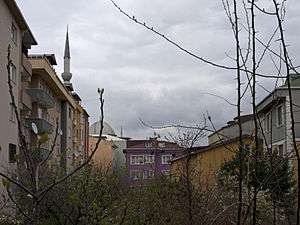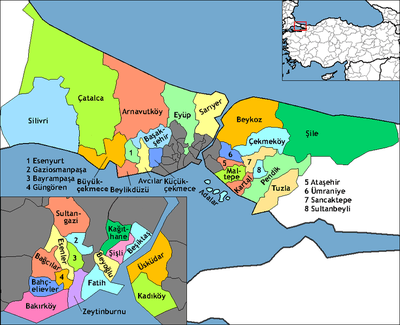Ümraniye
| Ümraniye | |
|---|---|
| district | |
|
View of Ümraniye from Kirişhane Cd. On the left, the minaret and the dome of the Hazreti Ömer Mosque | |
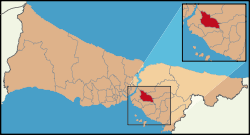 Location of Ümraniye in Istanbul | |
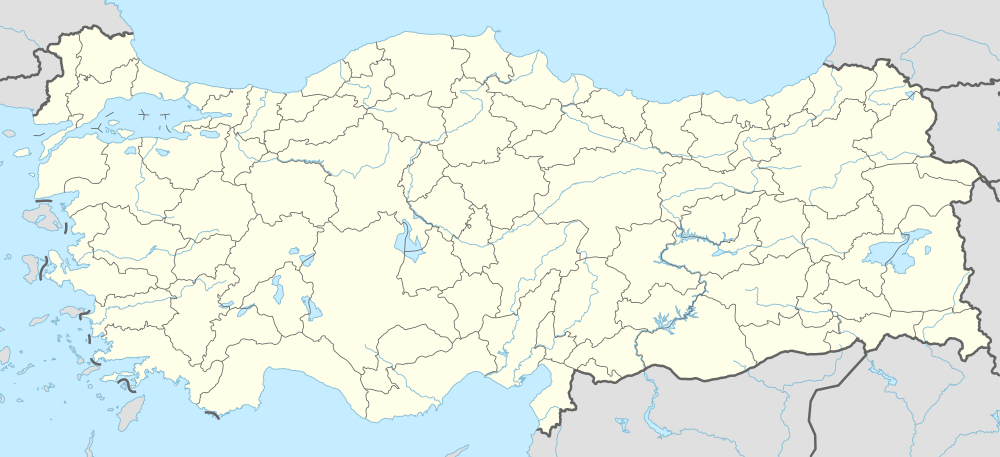 Ümraniye Location of Ümraniye in Istanbul | |
| Coordinates: 41°07′59″N 28°08′30″E / 41.13306°N 28.14167°ECoordinates: 41°07′59″N 28°08′30″E / 41.13306°N 28.14167°E | |
| Country | Turkey |
| City | Istanbul |
| Government | |
| • Mayor | Hasan Can (AKP) |
| • Governor | Mehmet Ali Yıldırım |
| Area[1] | |
| • District | 163.09 km2 (62.97 sq mi) |
| Population (2012)[2] | |
| • District | 645,238 |
| • District density | 4,000/km2 (10,000/sq mi) |
| Time zone | EET (UTC+2) |
| • Summer (DST) | EEST (UTC+3) |
| Area code(s) | 0-216 |
| Website |
www |
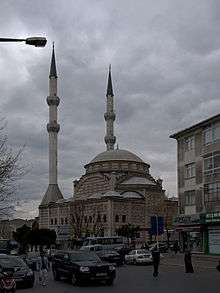
Ümraniye (pronounced [ymˈɾaːnije]) is a very large working class district of Istanbul, Turkey, with a population of over 650,000. It became district in 1987 by secession from Üsküdar. Also; Ömerli, Koçullu, Sırapınar and Hüseyinli villages were separated from Beykoz district in same year. Finally, Nişantepe quarter passed from Samandıra, where bounded to Kartal, to Alemdar, where bounded to Ümraniye in 2002. It has 7 municipalities: Ümraniye, Çekmeköy, Sarıgazi, Yenidoğan, Taşdelen (formerly Sultançiftliği), Alemdar (formerly Alemdağ) and Ömerli. Its neighbours are; Şile the northeast, Kartal the southeast, Kadıköy the south, Üsküdar the west and Beykoz the northwest. The mayor is Hasan Can (AKP).
History
Ümraniye is located on high ground just inland from Üsküdar. It began as a small village of under 900 people mainly immigrated from Black Sea Region, but in the early 1950s. Its population grew far beyond its capacity during the 1970s and 1980s due to migration to the cities from rural areas of Anatolia.
The growth of Ümraniye was better controlled than other districts that also attracted workers on the European side (such as Esenler or Gaziosmanpaşa); there are better, wider roads through the district, more space between the blocks and more green space in general. And better amenities, a large commercial district grew up to support this large population, the main road through the centre has shiny public buildings, big shops, shopping centres, branches of all the banks etc. And Ümraniye has high schools, a courthouse, cultural amenities such as cinema and all the other infrastructure of an urban area. And the traffic of course.Although it used to be a little village,Ümraniye now gives high class opportunities to its elites.
Ümraniye became famous after an arms cache allegedly belonging to conspiratorial Ergenekon network was discovered here in 2007.
Ümraniye today
With its natural landscape and urban design, Ümraniye was chosen as the cleanest district of Istanbul by ISTAC. Recently there has been a great deal of change in Ümraniye. Large shopping malls and entertainment centers have opened everywhere. Many housing projects have been developed in Umraniye to address the needs of all classes. Ümraniye is one of the fastest growing areas in Istanbul.
In the last few decades, Ümraniye has built a lively shopping and business district. Numerous international businesses are now based in Umraniye, which attract young, well-educated people from all over Turkey. At Ümraniye, you can find 34 kindergarten, 61 primary School and 9 high schools, as well as 22 sport-centers, and 29 hospitals and clinics. There are numerous athletic and cultural activities in Umraniye at 40 parks, 3 movie theaters and 3 theaters.
Recent building projects include the construction of large shopping malls (including Istanbul's first branch of IKEA), and modern apartments complexes have made parts of Ümraniye attractive places for people to buy real estate, especially as Ümraniye is on a main highway that leads to one of the two bridges linking the Asian and European sides of Istanbul. A car ride from Ümraniye to Mecidiyeköy, a business center on the European side of the city, may only take around 20 minutes in good traffic. Ümraniye also provides easy access to Üsküdar, Kadıköy and Ataşehir, the business capital of the Asian side of Istanbul.
Politics
Ümraniye has seen its fair share of political violence between left- and right-wingers over the years, and during the 70s and 80s law enforcement was problematic in parts of the area. In this way it was considered the Asian side's equivalent of Gaziosmanpaşa on the European side. This violence was concentrated in a small quarter of Ümraniye, a vast district. In recent times however, Ümraniye has been relatively calm, and the most dangerous crimes in the area are those typical of urban areas, such as pick-pocketing or theft and those political crime involved districts are now in limits of Ataşehir.
The people of Ümraniye usually vote in large numbers for conservative parties. The AK Party does well in this district.
Places of importance
In between Üsküdar and Ümraniye there is a 'çilehane' of the Sufi saint Aziz Mahmud Hudayi. A çilehane (cheelay-hahnay, lit. 'despair house') was where Sufis would go to pray in seclusion.
The Haldun Alagaş Sports Hall is located here, which is named after the multiple world and European champion of Karate. The venue hosts both national and international basketball, volleyball, handball games and martial art competitions.[3]
There is a newly made forestress where people can have walk and picnic. In some parts of Ümraniye,the full scene of Istanbul,including Bosphorus and European Side,can be seen easily. Also,Çamlıca hill is very close.
References
- ↑ "Area of regions (including lakes), km²". Regional Statistics Database. Turkish Statistical Institute. 2002. Retrieved 2013-03-05.
- ↑ "Population of province/district centers and towns/villages by districts - 2012". Address Based Population Registration System (ABPRS) Database. Turkish Statistical Institute. Retrieved 2013-02-27.
- ↑ "Haldun Alagaş Spor Kompleksi" (in Turkish). Spor AŞ. Retrieved 2012-11-27.
External links
| Wikimedia Commons has media related to Ümraniye. |
